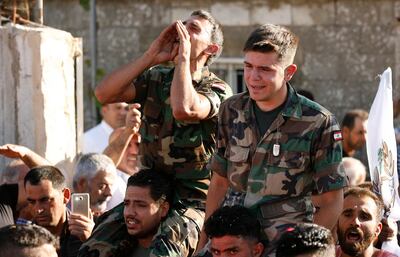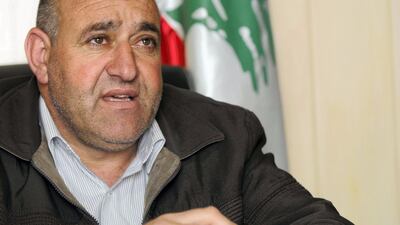Lebanese president Michel Aoun warned on Sunday against political interference in an investigation by the military into the abductions of security forces by militants in 2014.
Mr Aoun’s warning came a day after the Lebanese military announced the arrest of the former mayor of Arsal, the city where the abductions took place.
“Choose between the state and justice in court or the clan and the justice of revenge,” Mr Aoun tweeted, without clarifying exactly whom he might be addressing.
The investigation will also look into the takeover of Arsal by militants, which preceded the kidnappings of more than two dozen soldiers and police. Militants from ISIL and Fatah Tahrir Al Sham — an alliance dominated by the Al Qaeda-linked Jabhat Fatah Al Sham — briefly overran Arsal, only a few kilometres from the Syrian border, in August 2014.
Mr Aoun announced the investigation on Friday, shortly after a ceremony at the defence ministry to honour 10 of the kidnapped soldiers who were probably killed by ISIL. However, neither the presidency nor the army has explicitly linked Ali Al Hujairi’s detention to the investigation.
The army arrested Mr Al Hujairi’s son, Abada Mustafa Al Hujairi, in Arsal on September 1. The army said he had “several warrants” for his arrest.
"According to his confessions, his father has some relations to the terrorists," a Lebanese military spokesman told The National on Sunday. "Maybe he has some relation with the kidnapping, but for now he is under investigation."

The announcement of the investigation and the arrest come after calls for someone to be brought to justice in the kidnapping and deaths of the soldiers. Families of the missing soldiers, as well as observers, have criticised the deal last month that allowed ISIL fighters in Lebanon to withdraw to Syria after an eight-day offensive by the Lebanese army against their positions to the north of Arsal.
The militants were then granted passage by bus from the western side of Syria to ISIL-held territory in eastern Syria. They were also allowed to keep some of their weapons.
The army recovered the bodies of the missing soldiers after ISIL’s withdrawal.
Though the Lebanese army had stated when the offensive began that it would not pursue negotiations with ISIL, the Lebanese government had some involvement in negotiating the transfer, which was largely struck between ISIL and the Syrian government and Hizbollah.
Khalil Shadad, a spokesman for the families, said on Sunday that the investigation and Mr Al Hujairi’s arrest were positive steps towards addressing the families’ demands for justice.
Mr Shadad also said tents outside the Lebanese parliament, where families have held an off-and-on vigil for more than three years while waiting for news of their loved ones, would remain in place while they waited for justice in the case.
“A committee of parents will be formed to follow up the file with the concerned parties,” he added.
Arsal has felt the effects of Syria’s six-year-old civil war perhaps more than any other city in Lebanon. Its location had always made it a hub for smuggling between the two countries, but by 2012 the town was beset with refugees coming from Syria as fighting between rebels and the Syrian government intensified in the nearby city of Homs.
Fighters also fled the battlefield into Lebanon, turning the city into a haven for militants as well as refugees. The rugged mountains surrounding the city provided a further refuge from Lebanese security forces, and also some of the last rebel smuggling routes between Lebanon and Syria as the Lebanese and Syrian militaries, along with Hizbollah, slowly reclaimed control of the border.
Mr Al Hujairi’s former deputy mayor, Ahmed Fleity, was killed by rocket fire in July while working to negotiate the withdrawal of the fighters after the beginning of Hizbollah’s operation to remove Tahrir Al Sham to the south and east of Arsal in July.
Hizbollah’s defeat of Tahrir Al Sham resulted in negotiations that allowed more than 10,000 refugees and fighters in the area to return to Syria in a pair of deals, and left only the ISIL positions for the Lebanese army.
Arsal has a population of about 37,000 Lebanese and at least 40,000 Syrian refugees, many of whom live in tents inside the city and on its outskirts.
Rita Kroumbi, Arsal's deputy mayor, told The National on Sunday that the municipality was not involved in the investigation and that the situation in Arsal was improving, with some of the quarries in the area having reopened. Arsal's economy relies largely on rock quarries and fruit orchards on the outskirts of town, many of which had been shut down due to the presence of the army and the militants.
“The orchards will take a longer time, since we have missed this growing season,” Ms Kroumbi said.
The Lebanese military reported over the weekend that it was continuing to clear the areas around the city of munitions left behind by withdrawing militants.
_______________________________________
Read more:
Lebanon declares pause in offensive against ISIL
Relief after militants driven from Lebanon’s Arsal
_______________________________________

